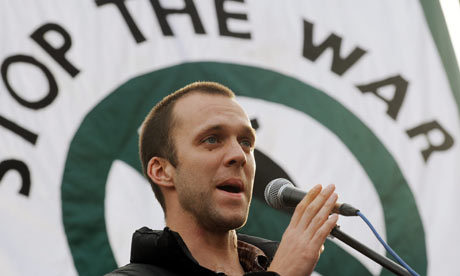When Joe Glenton went Awol, so did compassion
'Lucky' Lance Corporal Glenton refused to return to Afghanistan and was branded a coward and a malingerer
- Barbara Ellen
- The Observer, Sunday 7 March 2010

Joe Glenton, 27, faces two years in jail for refusing to return to fight in Afghanistan. Photograph: Andy Rain/EPA
The word I keep coming across in relation to Lance Corporal Joe Glenton is "lucky". Glenton, 27, who refused to return to Afghanistan, and went absent without leave for two years, speaking out against the war, has been demoted and sentenced to nine months.
Nine months was also the amount of time between Glenton's first tour of Afghanistan and when he was ordered back, despite government guidelines of an 18-month gap. Despite also Glenton admitting to losing faith in the conflict, feeling "guilty and useless", having nightmares about dead serviceman in coffins and generally showing symptoms of post-traumatic stress disorder. After this, Glenton was intimidated, bullied, branded a "coward" and "malingerer", which, strangely enough, is the point when he went Awol.
The "lucky" bit? That's because, as related with lip-smacking relish all over the internet, in the olden days Glenton would have been shot for desertion. No namby-pamby concern for a soldier's state of mind then – just a blindfold and a volley of bullets from a firing squad. "Lucky" Joe Glenton indeed!
Is this the best we can do when our soldiers fall to pieces and run away – not shoot them any more, as we did in their hundreds during the First World War? Indeed, while Glenton's loss of faith in the conflict doubtless contributed to his distress, this was not the whole story. Even if Glenton had been pro-war, surely his mental fragility would have remained a concern? So would a pro-war Glenton have received a more sympathetic hearing? Does "cowardice" conveniently transform into PTSD when the sufferer is on-message?
The army has to be tough on soldiers going Awol and no one is forced to sign up. However, could young men such as Glenton seriously be expected to know how they are going to handle war? And, if they can't, even if not on the frontline, how are they "cowards"? My grandfather survived Dunkirk, but did he? PTSD was not diagnosed then, but he returned, by all accounts, "a changed man" with what were then termed "bad nerves" and died in his 40s of a heart attack. Bloody malingerer, eh? And, you wonder, has battle shock changed so much since then? Or do we have sympathy for the distress of servicemen only when the footage is soaked in sepia and broadcast on the History channel?
Certainly it is unjust that, in some quarters, Glenton seems to have been cast almost as a joke figure – the British services answer to Mash's Corporal Klinger, who donned dresses and feigned madness to get himself discharged. Or a born-again hippie, placing flowers in the ends of rifles. What a crock. Pro-war, anti-war, the fact is that Glenton felt himself unravelling, appealed for help and received insults and a bollocking instead.
Are we in danger of regressing to a culture of white feathers – with nothing but scorn and judgment for those who "can't hack it", for whatever reason, in the war zone? Are our "brave boys" only adored when they are brave by military criteria? Indeed, while the outpourings of grief at Wootton Bassett for the fallen heroes are undeniably moving, one has to wonder, what is the point if people who don't die physically, but who fall mentally and emotionally, are treated so shabbily?
This is the tragedy of Glenton's sentencing. Some feel that he has been made an example of because of his anti-war beliefs. However, isn't he also an example to other servicemen, of what to expect if they dare to succumb to mental fragility? So, sure, Glenton was "luckier" than those deserters who used to be stood against walls and shot, but, by allegedly enlightened 21st century standards, is this anywhere near "lucky" enough?
http://www.guardian.co.uk/commentisfree/2010/mar/07/barbara-ellen-joe-glenton-awol